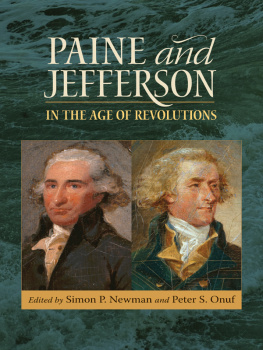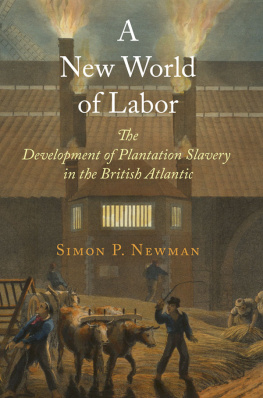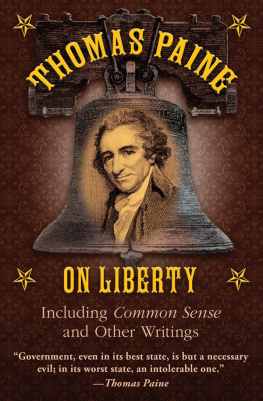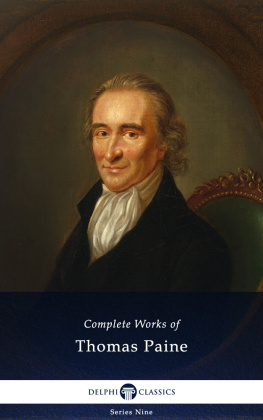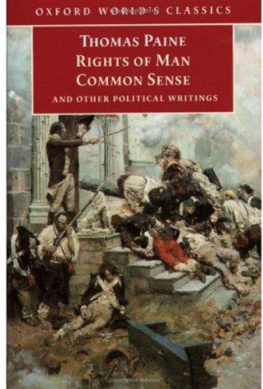Newman Simon P. - Paine and Jefferson in the Age of Revolutions
Here you can read online Newman Simon P. - Paine and Jefferson in the Age of Revolutions full text of the book (entire story) in english for free. Download pdf and epub, get meaning, cover and reviews about this ebook. year: 2013, publisher: University of Virginia Press, genre: Politics. Description of the work, (preface) as well as reviews are available. Best literature library LitArk.com created for fans of good reading and offers a wide selection of genres:
Romance novel
Science fiction
Adventure
Detective
Science
History
Home and family
Prose
Art
Politics
Computer
Non-fiction
Religion
Business
Children
Humor
Choose a favorite category and find really read worthwhile books. Enjoy immersion in the world of imagination, feel the emotions of the characters or learn something new for yourself, make an fascinating discovery.
- Book:Paine and Jefferson in the Age of Revolutions
- Author:
- Publisher:University of Virginia Press
- Genre:
- Year:2013
- Rating:3 / 5
- Favourites:Add to favourites
- Your mark:
- 60
- 1
- 2
- 3
- 4
- 5
Paine and Jefferson in the Age of Revolutions: summary, description and annotation
We offer to read an annotation, description, summary or preface (depends on what the author of the book "Paine and Jefferson in the Age of Revolutions" wrote himself). If you haven't found the necessary information about the book — write in the comments, we will try to find it.
Paine and Jefferson in the Age of Revolutions — read online for free the complete book (whole text) full work
Below is the text of the book, divided by pages. System saving the place of the last page read, allows you to conveniently read the book "Paine and Jefferson in the Age of Revolutions" online for free, without having to search again every time where you left off. Put a bookmark, and you can go to the page where you finished reading at any time.
Font size:
Interval:
Bookmark:

PAINE AND JEFFERSON
in the Age of Revolutions
JEFFERSONIAN AMERICA
Jan Ellen Lewis, Peter S. Onuf, and Andrew OShaughnessy
Series Editors
PAINE and JEFFERSON
in the Age of Revolutions

EDITED BY
Simon P. Newman
AND
Peter S. Onuf
UNIVERSITY OF VIRGINIA PRESS
Charlottesville and London
University of Virginia Press
2013 by the Rector and Visitors of the University of Virginia
All rights reserved
Printed in the United States of America on acid-free paper
First published 2013
1 3 5 7 9 7 8 6 4 2
Library of Congress Cataloging-in-Publication Data Paine and Jefferson in the age of revolutions / edited by Simon P. Newman and Peter S. Onuf.
pages cm. (Jeffersonian America)
Includes bibliographical references and index.
ISBN 978-0-8139-3476-1 (cloth : alk. paper) ISBN 978-0-8139-3477-8 (e-book)
1. Paine, Thomas, 17371809Philosophy. 2. Paine, Thomas, 17371809Influence. 3. Jefferson, Thomas, 17431826Philosophy. 4. Jefferson, Thomas, 17431826Influence. 5. United StatesHistoryRevolution, 17751783. 6. FranceHistoryRevolution, 17891799. I. Newman, Simon P. (Simon Peter), 1960 author, editor of compilation.
II. Onuf, Peter S., editor of compilation.
JC177.A4P35 2013
321.8092'273dc23 2013013750

Preparation of this volume has been supported by the Thomas Jefferson Foundation
PAINE AND JEFFERSON
in the Age of Revolutions
Introduction

SIMON P. NEWMAN and PETER S. ONUF
O N MARCH 4, 1809, Thomas Jefferson concluded his second term as president of the United States and retired from public life. Three months later, on June 8, Thomas Paine died in Greenwich Village, New York City. To mark the bicentennial of Paines death, a small group of scholars gathered at the Reform Club in London under the auspices of the Robert H. Smith International Center for Jefferson Studies. For three days, we discussed Thomas Paines place and significance in the Age of Revolution, often in direct comparison with his friend and fellow radical, Thomas Jefferson. This volume of essays is the result of that meeting in Londons great monument to democratic reform. Remarkably, this is the first collection of scholarly essays on Paine to have been published by a major press, and the first to examine Paine and Jefferson in relation to one another.
A generation later, Louis Hartz portrayed a consensual rather than a radical Paine whose anti-monarchism reflected the already existing liberal opinions of Americans. For Hartz, Paine was a common sense philosopher [who] had come to the most common sense country in the world. Hardly a radical, Hartzs Paine simply articulated the sentiments of liberal-minded colonists. Those historians who subsequently elaborated a republican synthesis in place of this liberal consensus acknowledged Paines contribution to the American Revolutionary cause, but neglected radical ideas that did not fit their interpretive framework. In his great work on the ideology of the American Revolution, Bernard Bailyn wrote more about attacks on Paines radicalism than on what Paine actually wrote and argued.
It is not only academics who have selectively appropriated Paine to serve their interpretative purposes. In late 1963, for example, the National Emergency Civil Liberties Committee (NECLC) presented a newly created Tom Paine Award to Bob Dylan, which he received with a short speech lauding contemporary political activists such as the members of the Student Nonviolent Coordinating Committee. On the other side of the political spectrum from the NECLC, libertarian conservatives such as Ronald Reagan have approvingly quoted Paines defense of individual liberty and his attacks on overly large and powerful government.
Sophia Rosenfelds recent Common Sense: A Political History has sought to place Paine along a well-traveled political continuum by demonstrating that throughout the eighteenth century, common sense was employed by both reactionaries and radicals to present their partisan ideals in the guise of un-controversial truth. In this light, Paine appears less as an idealistic radical and more as a polemicist who brilliantly deployed popular language to mobilize patriotic resistance to the Crown. His Common Sense was purchased by tens of thousands, and read by many more, and it clearly reached a far larger audience than did any of the more conservative articulations of this Enlightenment philosophy.
Seth Cotlar, in another recent volume, has argued that Paine helped inspire a radical democratic sensibility in the early American republic, with adherents favoring a participatory democratic nation. Cotlar suggests that newspapers and election rhetoric
Yet despite this excellent recent work, Paine continues to appear as a far more one-dimensional historical figure than does Jefferson. It remains far easier to recount the narrative of his remarkable life than to comprehend the nature and significance of ideas and writings that have resonated so differently with so many different kinds of people in the two centuries since his death. Paine was born in 1737 in the Norfolk market town of Thetford, and he worked in various careers and locations in England before departing for the colony of Pennsylvania in 1774. As editor of the Pennsylvania Magazine, his literary reputation grew, culminating with the publication of Common Sense in January 1776the most widely read and influential political pamphlet of the entire American Revolutionary struggle. During the early years of the war, he served with the Continental Army, and then with the Continental Congress, and wrote a series of essays known as The American Crisis, designed to rouse popular support for the patriot cause.
During the mid-1780s, Paine worked on his design for an iron bridge, which he took to Europe in 1787. The early stages of the French Revolution soon commanded his attention, and Paine was thrust into the second great revolution of his age, publishing Rights of Man in 1791 in response to Edmund Burkes highly critical Reflections on the Revolution in France. Although he spoke little French, Paine was elected as a deputy to the National Convention in late 1792. Soon he was mired in the internecine warfare of French Revolutionary politics, and after bravely arguing against the execution of Louis XVI, Paine rapidly lost ground. At the end of 1793, he was denounced, arrested, and imprisoned. Fortunate not to be executed, Paine was not released until November 1794.
Paine published the two-part Age of Reason between 1793 and 1795, and then in 1796 he published an acerbic open letter to his former comrade, George Washington, complaining that the president and his administration had done too little to protect Paine, an American citizen, during his imprisonment in Paris. In that same year, Paine published both Agrarian Justice and Decline and Fall of the English System of Finance.
Fearing capture by the British Royal Navy, Paine did not venture out of France until 1802, when a suspension in the Franco-British wars and an invitation from President Thomas Jefferson persuaded him to return to the United States. He continued to write and publish various essays, and to correspond with friends, but increasingly burdened by ill health, he stayed with friends and in rented accommodation, dying
Next pageFont size:
Interval:
Bookmark:
Similar books «Paine and Jefferson in the Age of Revolutions»
Look at similar books to Paine and Jefferson in the Age of Revolutions. We have selected literature similar in name and meaning in the hope of providing readers with more options to find new, interesting, not yet read works.
Discussion, reviews of the book Paine and Jefferson in the Age of Revolutions and just readers' own opinions. Leave your comments, write what you think about the work, its meaning or the main characters. Specify what exactly you liked and what you didn't like, and why you think so.

